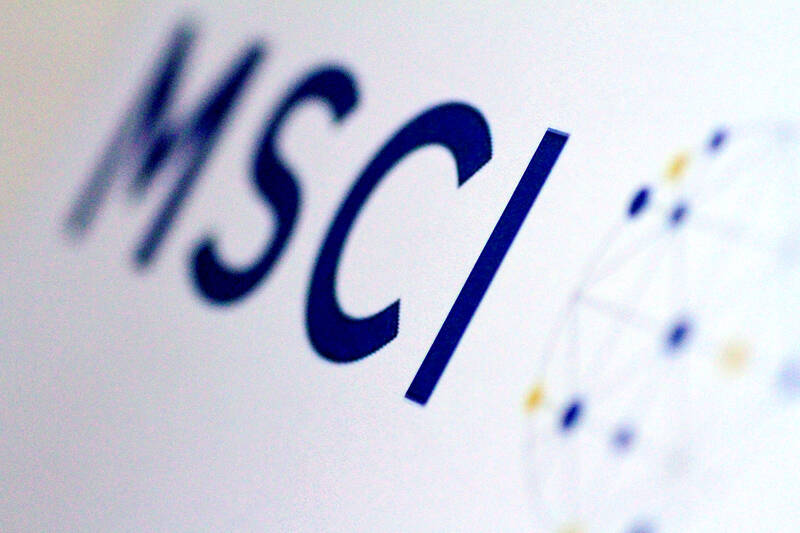MSCI Inc, a global index provider, has reduced Taiwan’s weighting in two major indices while leaving its weighting in another index unchanged after a regular adjustment.
In a statement released overnight, MSCI announced it has downgraded Taiwan’s weighting in the MSCI Emerging Markets Index, closely followed by foreign institutional investors, to 16.56 percent from 16.64 percent.
The index provider also reduced Taiwan’s weighting in the MSCI All-Country Asia ex-Japan Index to 18.99 percent from 19.04 percent, while leaving its weighting in the MSCI All-Country World Index unchanged at 1.74 percent.

Photo: Reuters
MSCI index reviews are conducted in February, May, August and November each year. The indices, provided in US dollar terms, help guide professional investors in adjusting their portfolios.
The latest index adjustments are set to take effect after the market closes on May 29.
Taiwan and Thailand experienced the steepest weighting cut of 0.08 percentage points in the MSCI Emerging Markets Index, while the United Arab Emirates saw the largest increase at 0.15 percentage points, MSCI said.
Weighting changes for other emerging markets in the MSCI Emerging Markets Index were limited following the index review.
MSCI decided not to add or remove any Taiwanese stocks from the MSCI Global Standard Indexes.
However, the index provider decided to add three Taiwanese stocks to the MSCI Global Small Cap Indexes: semiconductor raw material supplier Advanced Echem Materials Co (新應材), broadband connectivity solution provider EZconn Corp (光聖) and Taiwan Specialty Chemicals Corp (台特化), which produces specialty electronic-grade gases for semiconductor production.
Market analysts said the inclusion of the three companies reflects their recent gains in share prices.
Following the inclusion, shares of Advanced Echem Materials and Taiwan Specialty Chemicals surged 10 percent, the maximum daily increase, closing at NT$539 and NT$211 respectively yesterday. Shares of EZconn also rose 7.04 percent, closing at NT$463.5.
MSCI decided to remove 24 Taiwanese stocks from the MSCI Global Small Cap Indexes, including automotive electronics maker Actron Technology Corp (朋程), biotech venture capitalist Diamond Biofund Inc (鑽石生技), printed circuit board maker Dynamic Holding Co (定穎), property developer Farglory FTZ Investment Holding Co (遠雄自貿港) and touch panel producer TPK Holding Co (宸鴻).
After the review, the number of constituents in the MSCI Taiwan Index remains unchanged at 88.
Among the 88 stocks, biotech firm PharmaEssentia Corp (藥華藥) saw the largest increase, with its weighting rising by 0.02 percentage points to 0.31 percent, while telecom Taiwan Mobile Co (台灣大哥大) experienced the steepest cut, with its weighting decreasing by 0.02 percentage points to 0.49 percent.

The DBS Foundation yesterday announced the launch of two flagship programs, “Silver Motion” and “Happier Caregiver, Healthier Seniors,” in partnership with CCILU Ltd, Hondao Senior Citizens’ Welfare Foundation and the Garden of Hope Foundation to help Taiwan face the challenges of a rapidly aging population. The foundation said it would invest S$4.91 million (US$3.8 million) over three years to foster inclusion and resilience in an aging society. “Aging may bring challenges, but it also brings opportunities. With many Asian markets rapidly becoming super-aged, the DBS Foundation is working with a regional ecosystem of like-minded partners across the private, public and people sectors

Taiwan Semiconductor Manufacturing Co (TSMC, 台積電) has secured three construction permits for its plan to build a state-of-the-art A14 wafer fab in Taichung, and is likely to start construction soon, the Central Taiwan Science Park Bureau said yesterday. Speaking with CNA, Wang Chun-chieh (王俊傑), deputy director general of the science park bureau, said the world’s largest contract chipmaker has received three construction permits — one to build a fab to roll out sophisticated chips, another to build a central utility plant to provide water and electricity for the facility and the other to build three office buildings. With the three permits, TSMC

BREAKTHROUGH TECH: Powertech expects its fan-out PLP system to become mainstream, saying it can offer three-times greater production throughput Chip packaging service provider Powertech Technology Inc (力成科技) plans to more than double its capital expenditures next year to more than NT$40 billion (US$1.31 billion) as demand for its new panel-level packaging (PLP) technology, primarily used in chips for artificial intelligence (AI) applications, has greatly exceeded what it can supply. A significant portion of the budget, about US$1 billion, would be earmarked for fan-out PLP technology, Powertech told investors yesterday. Its heavy investment in fan-out PLP technology over the past 10 years is expected to bear fruit in 2027 after the technology enters volume production, it said, adding that the tech would

YEAR-END BOOST: The holiday shopping season in the US and Europe, combined with rising demand for AI applications, is expected to drive exports to a new high, the NDC said Taiwan’s business climate monitor improved last month, transitioning from steady growth for the first time in five months, as robust global demand for artificial intelligence (AI) products and new iPhone shipments boosted exports and corporate sales, the National Development Council (NDC) said yesterday. The council uses a five-color system to measure the nation’s economic state, with “green” indicating steady growth, “red” suggesting a boom and “blue” reflecting a recession. “Yellow-red” and “yellow-blue” suggest a transition to a stronger or weaker condition. The total score of the monitor’s composite index rose to 35 points from a revised 31 in August, ending a four-month